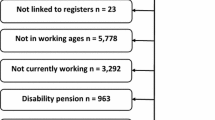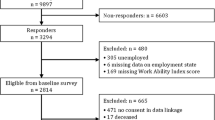Abstract
Objective
The aim of this paper is to examine the relationship between self-reported work ability and long-term term of sickness absence or early retirement from the labour market.
Methods
Data on work ability were retrieved from a representative cohort study of Danish wage earners and linked with a register of social payment transfers. In all, 4.743 individuals were followed from 2001 to 2005. Cox regression was used for the analyses.
Results
A one point decrease in perceived work ability, on a 10 point scale, was associated with an increased risk of long-term sickness absence (LTSA) of 15.1% (95% CI 12–19%, P < 0.0001) and an increased risk of early retirement from the labour market of 33% (95% CI 20–48%, P < 0.0001).
Conclusions
Reports of reduced work ability were significantly associated with both an increased risk of onset of LTSA and early retirement from the labour market, after adjustment for socio-demographic characteristics and lifestyle variables.
Similar content being viewed by others
References
Burr H, Bjorner JB, Kristensen TS, Tuchsen F, Bach E (2003) Trends in the Danish work environment in 1990–2000 and their associations with labor-force changes. Scand J Work Environ Health 29:270–279
Christensen KB, Lund T, Labriola M, Bültmann U, Villadsen E (2007) The impact of health behaviour on long term sickness absence: results from DWECS/DREAM. Ind Health 45:348–351
Cox DR (1972) Regression models and life-tables. J Roy Stat Soc 34:187–220
Dahlberg R, Bildt C, Vingard E, Karlqvist L (2007) Educational background: different processes and consequences on health and physical and mental exposures among women and men. Work 28:57–66
Fjell Y, Alexanderson K, Karlqvist L, Bildt C (2007) Self-reported musculoskeletal pain and working conditions among employees in the Swedish public sector. Work 28:33–46
Gamperiene M, Nygard JF, Sandanger I, Lau B, Bruusgaard D (2008) Self-reported work ability of Norwegian women in relation to physical and mental health, and to the work environment. J Occup Med Toxicol 3:8. doi:10.1186/1745-6673-3-8
Hasselhorn H-M, Tackenberg P, Müller BH (2007) Working Conditions and intent to leave the profession among nursing staff in Europe. Report No 7: 2003, University of Wuppertal
Hopsu L, Leppanen A, Ranta R, Louhevaara V (2005) Perceived work ability and individual characteristics as predictors for early exit from working life in professional cleaners. Int Congr Ser 1280:84–88. doi:10.1016/j.ics.2005.03.062
Ilmarinen J, Tuomi K (1992) Work ability of aging workers 24. Scand J Work Environ Health 18(Suppl 2):8–10
Kujala V, Tammelin T, Remes J, Vammavaara E, Ek E, Laitinen J (2006) Work ability index of young employees and their sickness absence during the following year. Scand J Work Environ Health 32:75–84
Liira J, Matikainen E, Leino-Arjas P, Malmivaara A, Mutanen P, Rytkonen H, Juntunen J (2000) Work ability of middle-aged Finnish construction workers—a follow-up study in 1991–1995. Int J Ind Ergon 25:477–481. doi:10.1016/S0169-8141(99)00032-3
Lindberg P, Vingard E, Josephson M, Alfredsson L (2006) Retaining the ability to work—associated factors at work. Eur J Public Health 16:470–475. doi:10.1093/eurpub/cki190
Lund T, Labriola M, Christensen KB, Bultmann U, Villadsen E, Burr H (2005) Psychosocial work environment exposures as risk factors for long term sickness absence among Danish employees: results from DWECS/DREAM. JOEM 47:1141–1147
Lund T, Labriola M, Christensen KB, Bultmann U, Villadsen E (2006) Physical work environment risk factors for long term sickness absence: prospective findings among a cohort of 5357 employees in Denmark. BMJ 332:449–452. doi:10.1136/bmj.38731.622975.3A
Lund T, Labriola M, Villadsen E (2007) Who is at risk for long-term sickness absence? A prospective cohort study of Danish employees. Work 28:225–230
MacKinnon DP, Fairchild AJ, Fritz MS (2007) Mediation analysis. Annu Rev Psychol 58:593–614. doi:10.1146/annurev.psych.58.110405.085542
Melchior M, Niedhammer I, Berkman LF, Goldberg M (2003) Do psychosocial work factors and social relations exert independent effects on sickness absence? A six year prospective study of the GAZEL cohort. J Epidemiol Community Health 57:285–293. doi:10.1136/jech.57.4.285
Nurminen E, Malmivaara A, Ilmarinen J, Ylostalo P, Mutanen P, Ahonen G, Aro T (2002) Effectiveness of a worksite exercise program with respect to perceived work ability and sick leaves among women with physical work. Scand J Work Environ Health 28:85–93
Nygard CH, Arola H, Siukola A, Savinainen M, Luukkaala T, Taskinen H, Virtanen P (2005) Perceived work ability and certified sickness absence among workers in a food industry. Int Congr Ser 1280:296–300. doi:10.1016/j.ics.2005.02.062
Reiso H, Nygard JF, Brage S, Gulbrandsen P, Tellnes G (2001) Work ability and duration of certified sickness absence. Scand J Public Health 29:218–225. doi:10.1177/14034948010290031201
Salonen P, Arola H, Nygard CH, Huhtala H, Koivisto AM (2003) Factors associated with premature departure from working life among ageing food industry employees. Occup Med (Lond) 53:65–68. doi:10.1093/occmed/kqg012
Schochet P, Rangarajan A (2004) Characteristics of low-wage workers and their labor market experiences: evidence from the mid- to late 1990s. Mathematica Policy Research, Princeton (1), 66
Sell L, Faber A, Søgaard K (2008) Impacts from occupational risk factors on self reported reduced work ability among Danish wages earners. In: Masaharu K (eds) Promotion of work ability towards productive aging: selected papers of the 3rd international symposium on work ability, Hanoi, 22–24 October. Taylor and Francis, London
Tuomi K, Ilmarinen JE, Jahkola A, Katajarinne L, Tulkki A (1998) Work ability index, 2nd edn. Finnish Institute of Occupational Health, Helsinki
UN Department of Economic and Social Affairs PD2 (2007) World population prospects (revised)
van der Berg TIJ, Alavinia SM, Bredt FJ, Lindeboom D, Elders LAM, Burhof A (2008) The influence of psychosocial factors at work and life style on health and work ability among professional workers. Int Arch Occup Environ Health 81:1029–1036. doi:10.1007/s00420-007-0296-7
Vingard E, Lindberg P, Josephson M, Voss M, Heijbel B, Alfredsson L, Stark S, Nygren A (2005) Long-term sick-listing among women in the public sector and its associations with age, social situation, lifestyle, and work factors: a three-year follow-up study. Scand J Public Health 33:370–375. doi:10.1080/14034940510005860
Acknowledgments
We would like to thank Thomas Lund, Senior researcher, PhD in medical science, The Danish National Centre for Social Research, Herluf Trolles Gade 11, DK-1052 Copenhagen, for his pioneering work on the DWECS and DREAM-database. The study was supported by a grant from the Danish Working Environment Research Foundation and elaborated within the finale program for prevention of reduced work ability.
Author information
Authors and Affiliations
Corresponding author
Additional information
An erratum to this article can be found at http://dx.doi.org/10.1007/s00420-009-0420-y
Appendix 1
Rights and permissions
About this article
Cite this article
Sell, L. Predicting long-term sickness absence and early retirement pension from self-reported work ability. Int Arch Occup Environ Health 82, 1133–1138 (2009). https://doi.org/10.1007/s00420-009-0417-6
Received:
Accepted:
Published:
Issue Date:
DOI: https://doi.org/10.1007/s00420-009-0417-6




